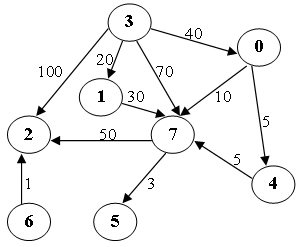6-16 Shortest Path [3] (25分)
Posted 8023spz
tags:
篇首语:本文由小常识网(cha138.com)小编为大家整理,主要介绍了6-16 Shortest Path [3] (25分)相关的知识,希望对你有一定的参考价值。
Write a program to not only find the weighted shortest distances, but also count the number of different minimum paths from any vertex to a given source vertex in a digraph. It is guaranteed that all the weights are positive.
Format of functions:
void ShortestDist( MGraph Graph, int dist[], int count[], Vertex S );
where MGraph is defined as the following:
typedef struct GNode *PtrToGNode;
struct GNode{
int Nv;
int Ne;
WeightType G[MaxVertexNum][MaxVertexNum];
};
typedef PtrToGNode MGraph;
The shortest distance from V to the source S is supposed to be stored in dist[V]. If V cannot be reached from S, store -1 instead. The number of different minimum paths from V to the source S is supposed to be stored in count[V] and count[S]=1.
Sample program of judge:
#include <stdio.h>
#include <stdlib.h>
typedef enum {false, true} bool;
#define INFINITY 1000000
#define MaxVertexNum 10 /* maximum number of vertices */
typedef int Vertex; /* vertices are numbered from 0 to MaxVertexNum-1 */
typedef int WeightType;
typedef struct GNode *PtrToGNode;
struct GNode{
int Nv;
int Ne;
WeightType G[MaxVertexNum][MaxVertexNum];
};
typedef PtrToGNode MGraph;
MGraph ReadG(); /* details omitted */
void ShortestDist( MGraph Graph, int dist[], int count[], Vertex S );
int main()
{
int dist[MaxVertexNum], count[MaxVertexNum];
Vertex S, V;
MGraph G = ReadG();
scanf("%d", &S);
ShortestDist( G, dist, count, S );
for ( V=0; V<G->Nv; V++ )
printf("%d ", dist[V]);
printf("
");
for ( V=0; V<G->Nv; V++ )
printf("%d ", count[V]);
printf("
");
return 0;
}
/* Your function will be put here */
Sample Input (for the graph shown in the figure):
8 11
0 4 5
0 7 10
1 7 30
3 0 40
3 1 20
3 2 100
3 7 70
4 7 5
6 2 1
7 5 3
7 2 50
3
Sample Output:
40 20 100 0 45 53 -1 50 1 1 4 1 1 3 0 3
代码:
#include <stdio.h> #include <stdlib.h> typedef enum {false, true} bool; #define INFINITY 1000000 #define MaxVertexNum 10 /* maximum number of vertices */ typedef int Vertex; /* vertices are numbered from 0 to MaxVertexNum-1 */ typedef int WeightType; typedef struct GNode *PtrToGNode; struct GNode{ int Nv; int Ne; WeightType G[MaxVertexNum][MaxVertexNum]; }; typedef PtrToGNode MGraph; MGraph ReadG() { /* details omitted */ MGraph mg = (MGraph)malloc(sizeof(struct GNode)); int a,b,c; scanf("%d%d",&mg -> Nv,&mg -> Ne); for(int i = 0;i < mg -> Nv;i ++) { for(int j = 0;j < mg -> Nv;j ++) { mg -> G[i][j] = INFINITY; } } for(int i = 0;i < mg -> Ne;i ++) { scanf("%d%d%d",&a,&b,&c); mg -> G[a][b] = c; } return mg; } void ShortestDist( MGraph Graph, int dist[], int count[], Vertex S ); int main() { int dist[MaxVertexNum], count[MaxVertexNum]; Vertex S, V; MGraph G = ReadG(); scanf("%d", &S); ShortestDist( G, dist, count, S ); for ( V=0; V<G->Nv; V++ ) printf("%d ", dist[V]); printf(" "); for ( V=0; V<G->Nv; V++ ) printf("%d ", count[V]); printf(" "); return 0; } /* Your function will be put here */ void ShortestDist( MGraph Graph, int dist[], int count[], Vertex S ) { int vis[MaxVertexNum] = {0}; for(int i = 0;i < Graph -> Nv;i ++) { dist[i] = INFINITY; count[i] = 0; } dist[S] = 0; count[S] = 1; while(1) { int t = -1,m = INFINITY; for(int i = 0;i < Graph -> Nv;i ++) { if(!vis[i] && m > dist[i]) m = dist[i],t = i; } if(t == -1) break; vis[t] = 1; for(int i = 0;i < Graph -> Nv;i ++) { if(vis[i] || Graph -> G[t][i] == INFINITY) continue; if(dist[t] + Graph -> G[t][i] < dist[i]) { dist[i] = dist[t] + Graph -> G[t][i]; count[i] = count[t]; } else if(dist[t] + Graph -> G[t][i] == dist[i]) { count[i] += count[t]; } } } for(int i = 0;i < Graph -> Nv;i ++) { if(dist[i] == INFINITY) dist[i] = -1; } }
以上是关于6-16 Shortest Path [3] (25分)的主要内容,如果未能解决你的问题,请参考以下文章
